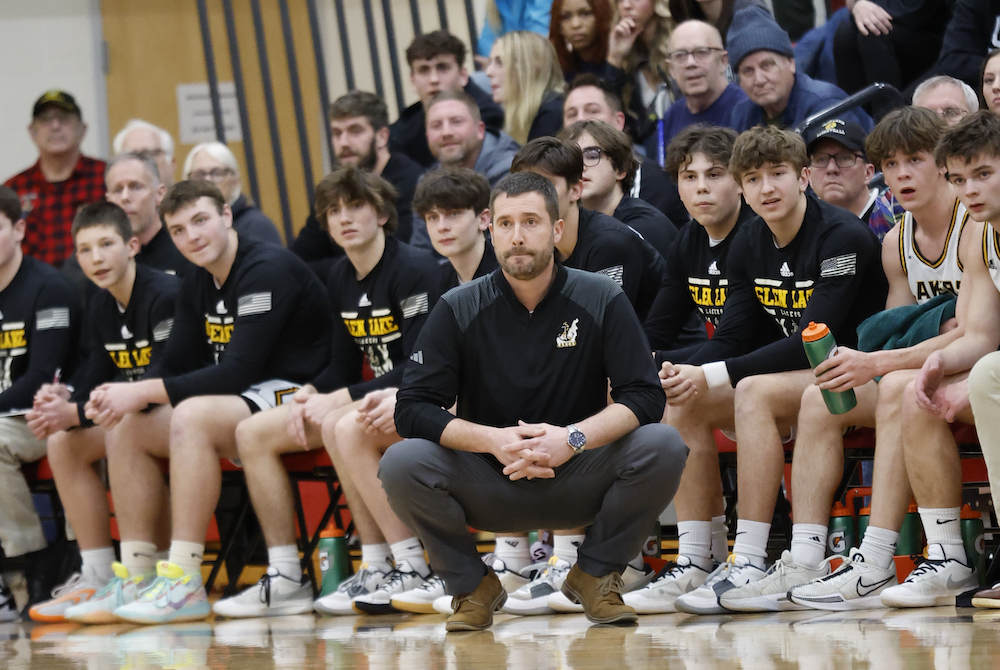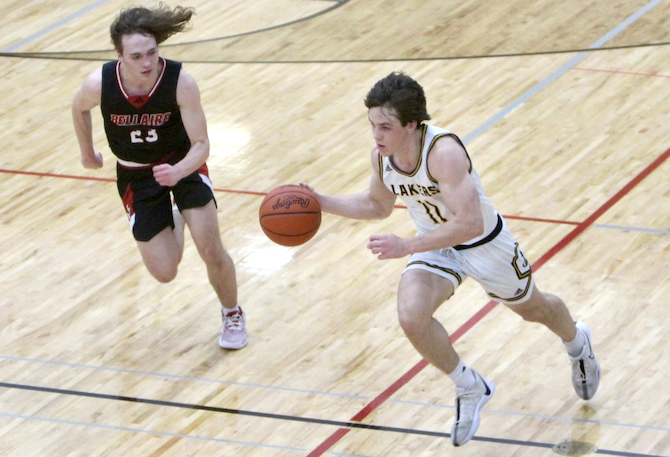
CAP Begins 2014-15 on Record Pace
By
Geoff Kimmerly
MHSAA.com senior editor
August 22, 2014
Gretchen Mohney has come to recognize coaches who think they already know it all.
Then she begins a Coaches Advancement Program lesson by describing an orange banging around inside a fishbowl – a metaphor to explain the brain inside an athlete’s skull when he or she suffers a concussion.
Her most powerful lessons have moved pupils to tears. And it’s always gratifying to witness the “Aha” moments that make the CAP educational experience so powerful.
“My favorite is when they admit that they’ve done something wrong, and they want to know how to do something better,” said Mohney, a highly-respected trainer and strength and conditioning coach who also serves as an instructor for the athletic training program at Western Michigan University. “It’s a pretty awesome moment when they realize there’s more to learn.”
More current and aspiring coaches than ever before are taking advantage of that opportunity as the 2014-15 school year kicks off.
Since this training year began July 25 at Battle Creek Lakeview, 273 current or aspiring coaches have completed CAP sessions – nearly twice as many coaches as this point a year ago and with the last session of August planned for Saturday at New Buffalo. That makes this the busiest start in CAP history, according to MHSAA assistant director Kathy Vruggink Westdorp, who joined the MHSAA staff in 2004, developed CAP for the 2004-05 school year and continues to oversee the program.
This first month’s total attendance also represents 33 percent of the 818 total CAP units completed at high schools and the MHSAA office during all of 2013-14.
“I think the big thing continues to be word of mouth that this is a quality program,” said Hamilton athletic director Jerry Haggerty, a CAP instructor for nine years. “It’s good for all coaches of all experience levels.”
Setting a standard
Since the program’s inception, nearly 6,300 coaches have completed at least the first-level unit. More than 1,000 have advanced through CAP 4.
The CAP program is broken into six levels, each addressing a set of topics:
- CAP 1: Coaches Make the Difference, The Coach as Teacher, Sports Medicine and First Aid.
- CAP 2: Effective Communication, Legal Responsibilities, Psychology of Coaching.
- CAP 3: Additional Coaching Responsibilities, Effectively Working with Parents, The Coach as Performer.
- CAP 4: Understanding Athletic Development, Strength and Conditioning, Preparing for Success.
- CAP 5: Healthy Living, Teaching Emotional Toughness, Resolving Conflicts in Athletics.
- CAP 6: Current Issues and Topics in Educational Athletics.
“Individuals who go through this have a better understanding of their philosophy, their school’s philosophy, their role and responsibility as well as the meaning behind MHSAA rules,” said Westdorp, a former principal, athletic director, teacher and coach in the Grand Rapids area who was named 2013 Coach Educator of the Year by the National Federation of State High School Associations (NFHS) for her work with the program.
She trains and evaluates all presenters and instructors, including those who last school year administered 1,238 CAP sessions at seven universities and colleges across both peninsulas.
The non-college CAP sessions are taught by 20 instructors who pride themselves on being available anywhere there’s interest. CAP has been presented at 10 Lower Peninsula schools over the last month, with Upper Peninsula sessions planned for this fall. August 9 was particularly busy – units were taught at Jonesville, Pontiac Notre Dame Prep and Riverview Gabriel Richard – but Westdorp sees the possibility of presenting at up to five sites on the same day.
Flexibility also is an option; a group of mostly non-school coaches took CAP 2 last week in Baldwin, and were able to complete the course over two days instead of one so they could do so without interrupting their fulltime jobs. For coaches working in schools, CAP units can qualify as continuing education credits with the State Department of Education.
Colleges and universities in Michigan are licensed to present up to five levels through their undergraduate or graduate studies, and the list of those who completed courses the last few years is filled with recognizable names of former high achievers on MHSAA courts and fields. Southwestern Michigan College in Dowagiac will offer courses for the first time this fall.
Certification in the program occurs after completion of CAP 1 and 2, and then after each subsequent unit, with those completing CAP 6 earning Masters Elite Certification.
The topics of CAP sessions “bleed” into each other, Mohney said, and come with plenty of first-person examples to make them relevant to coaches who then realize they aren’t alone facing issues most encounter.
“I talk to them because I’ve been there. … (I say,) ‘Now, let’s talk real.’ I place them in a real situation,” Mohney said. “’The biggest thing is you guys don’t have to know everything. You just need to coach, be aware of this, this and that. And these are some ideas to go about your plan so you can decrease your stress.’
“Any time a coach hears that, it’s a beautiful thing. Because I’m not sure what coach in high school is in coaching for the money.”
Raising the bar
Certainly, some of this month’s heightened CAP participation can be attributed to an MHSAA Representative Council action in March. Beginning Aug. 1, 2016, varsity head coaches hired for the first time at an MHSAA member school must have completed CAP 1 or CAP 2. Westdorp said some who wish to become head coaches in that near future are getting a jump by completing CAP courses now.
But that’s only a slice of the success story.
Haggerty has directed Hamilton’s athletic department for 15 years and said all of his coaches have taken either CAP 1 or 2. Many coaches take the courses on their own; others are required to do so by their athletic directors.
The Capital Area Activities Conference will offer CAP 1 three times this school year, with 100-150 coaches from their 20 member schools expected for each session. Others leagues and conferences are designing similar arrangements.
Michael Roy coached boys basketball at Lawton and girls hoops at Vicksburg and was certified under the predecessor to CAP – the MHSAA’s former Program for Athletic Coaches’ Education (PACE). He’s beginning his 13th year as Vicksburg’s athletic director, and after hosting several CAP classes over the years decided to begin the program himself this month.
“The need for knowledgeable and experienced coaches is greater than ever before. I thought if I was going to make it mandatory for my coaches to become CAP certified, that I needed to get CAP certified and lead by example,” Roy said. “The heart of any athletic team or program is its coaching staff. CAP is the surest way for coaches to access everything they need to know how to be a good coach. They learn the art of effective coaching through one of the best-designed coaches education programs in the country. CAP is second to none.”
Haggerty has spoken with athletic directors who have completed the program and then recognize when their coaches employ strategies learned at CAP sessions. An increasing pool of coaching candidates are heading into interviews with CAP certification in hand, and Westdorp has seen coaches bringing their CAP binders to practices to have those lessons available for quick reference. She’s also watched many CAP graduates using their skills at the highest level – the MHSAA Finals.
A comment by Duke men’s basketball coach Mike Krzyzewski sits at the front of those CAP binders: “A common mistake among those who work in sport is spending a disproportional amount of time on x’s and o’s as compared to time spent learning about people.”
Haggerty starts each session telling his pupils, “I do this for two reasons; one because I think it’s important to look at the non-x and o coaching realms; and two, because this is great fun for me.’”
And those coaches who come into CAP thinking they know enough? Mohney said most finish the first unit looking forward to beginning the next.
“CAP has a lot to do with understanding what you’re about, understanding your role and responsibility in athletics and your leadership role,” Westdorp said. “When I start programs, I talk about my work roles in life, and then (I tell coaches), ‘I want to tell you where I felt I was more influential, and that was as a coach.
“’And don’t ever forget it..’”
Click for more on the Coaches Advancement Program.
PHOTOS: These coaches, counter-clockwise from top left, all have completed at least one CAP unit: Bay City Western softball coach Rick Garlinghouse, St. Ignace girls basketball coach Dorene Ingalls, Ypsilanti Community boys basketball coach Steve Brooks, Beal City baseball coach Brad Antcliff and Mattawan softball coach Alicia Smith.

After Leading Glen Lake Girls to Title, Bradford Brings Boys Into Final Week
By
Tom Spencer
Special for MHSAA.com
March 15, 2024
Eight is Enough.
 Or is it?
Or is it?
For Jason Bradford growing up on the farm of Arden and Lynn Bradford as one of their eight children, it probably was enough. Bradford’s upbringing may have been slightly similar to “Eight Is Enough,” a comedy-drama television series about a family with eight children that aired on ABC from March of 1977 to May of 1981.
But the show didn’t depict pick-up basketball being played in the barn like it was for Bradford and his siblings. And surely eight would not be enough Regional basketball championships for Jason Bradford, nor enough District titles either.
After leading Maple City Glen Lake to the Division 4 girls basketball championship last year, Bradford stepped down from coaching. At the time his teams had won five Regional and six District titles.
Now his teams have won six Regional and seven District championships. He took over Glen Lake’s boys program during the holiday break this winter as the Lakers were off to a 4-2 start. They finished the season 22-5.
It was the Lakers boys’ first 20-win campaign since the 2018-19 season, and they clinched their first Regional title since 2018.
Glen Lake went 19-5 last year losing to Traverse City St. Francis in the District Final. The season before that ended with a first-round loss to Elk Rapids and 15-6 record.
Bradford led his girls teams four times to the MHSAA Semifinals and almost got their a fifth time this year with the boys. Their run ended Tuesday with a tough loss in the Division 4 Quarterfinals to Mount Pleasant Sacred Heart, 63-51.
“We’re licking the wounds of that one,” he said. “We’ve got to remember to look at the big picture – they are young men becoming men.”
 But Bradford already has turned his thoughts to next season and is making plans for summer basketball.
But Bradford already has turned his thoughts to next season and is making plans for summer basketball.
“Having the summer with them if it goes the way we want is going to be huge,” Bradford said. “There are a few things going through my head I can change or adjust.
“We want to continue to build on what our philosophy of what Glen Lake is and my philosophy of what Glen Lake is.”
The Lakers will graduate Cooper Bufalini, Gage Baker, Dylan Cundiff, Tyler Bixby and Jamie Blondia. But they’ll have their top two scorers back, sophomore Jacob Plamondon and junior Benji Allen. Plamondon kicked in almost 20 points per game and led the team in rebounding with more than 10 per contest. Allen averaged more than 11 points per game and led the team in assists.
Glen Lake finished second in the Northwest Conference behind Benzie Central, which was undefeated in league play. The Lakers knocked off league opponents Frankfort in the Division 4 District title match and Buckley in the Regional Semifinal.
The battles with Benzie for the conference title may have been the highlights of the season, Bradford noted. Those were Glen Lake’s only losses in league play, and a share of the title was within their grasp late in the second game with the Huskies.
The Lakers lost 60-51 on their home court in the first meeting but took Benzie to the limit in the rematch before falling, 41-39, on the road.
“We had a lot of great games and a lot of great memories,” Bradford said. “Going for conference it pretty much came down to the last few seconds with lead changes.
“We were up by one point with less than 30 second lefts, and that was the high point,” he continued. “We came up short, but we learned from that game.”
Also among highlights for Bradford this year was the chance to coach against his brother Nathan for the first time in their careers.
 The Bradfords started coaching girls varsity basketball 16 years ago, but their teams were in different conferences at the time. Nathan coached the Onekama girls but moved to the boys program before Onekama and Glen Lake had a chance to compete against each other in the Northwest Conference.
The Bradfords started coaching girls varsity basketball 16 years ago, but their teams were in different conferences at the time. Nathan coached the Onekama girls but moved to the boys program before Onekama and Glen Lake had a chance to compete against each other in the Northwest Conference.
The Bradford coaches often talk after their games and learn from one another. They have also seen their parents frequently in the bleachers as they rotate home game sites to see their grandchildren play and their sons coach.
When Onekama and Glen Lake played this year, eight Bradfords were on the rosters as players or coaches. Jason’s son Toby, a freshman, played on the Glen Lake junior varsity team, as Nathan’s son Carson played for the Portagers’ JV squad. The Onekama JV team is coached by another Bradford, Jason and Nathan’s brother Nick. And there were three more Bradfords on the varsity – Nathan’s son Caden and his cousins Luke and Arden.
Glen Lake won both varsity games, 38-36 at Onekama and 61-33 at home.
Jason and his wife Jackie have five children. Their youngest son, Drew, is now a sixth grader at Glen Lake. His oldest son, J.J., is at Michigan Tech and has begun officiating basketball after his senior season at Glen Lake cut short by the pandemic while the Lakers were preparing to play in a 2020 District Final. Daughters Maddie and Grace are playing basketball for Lake Superior State University.
Maddie and Grace were big parts of Glen Lake’s deep postseason runs with Jason as girls coach. With many games played on Saturdays and not conflicting with coaching, Jason, Jackie and the younger boys were able to travel to see the Upper Peninsula’s Lakers play regularly.
This season, the Glen Lake girls – under first-year head coach Brad Fosmore – went 16-8 and won Northwest Conference and District titles before losing a nail-biter, 45-42, to league rival Frankfort in the Regional Semifinal.
“Jason did a good job, and it felt good to carry on the tradition,” said Fosmore, who previously served as a Lakers JV coach. “We took it one game at a time.
“Jason worked hard to build a great girls program,” he continued. “It made it pretty simple because they had that winning tradition and kind of kept it rolling.”
 Tom Spencer is a longtime MHSAA-registered basketball and soccer official, and former softball and baseball official, and he also has coached in the northern Lower Peninsula area. He previously has written for the Saginaw News, Bay County Sports Page and Midland Daily News. He can be reached at [email protected] with story ideas for Manistee, Wexford, Missaukee, Roscommon, Ogemaw, Iosco, Alcona, Oscoda, Crawford, Kalkaska, Grand Traverse, Benzie, Leelanau, Antrim, Otsego, Montmorency, Alpena, Presque Isle, Cheboygan, Charlevoix and Emmet counties.
Tom Spencer is a longtime MHSAA-registered basketball and soccer official, and former softball and baseball official, and he also has coached in the northern Lower Peninsula area. He previously has written for the Saginaw News, Bay County Sports Page and Midland Daily News. He can be reached at [email protected] with story ideas for Manistee, Wexford, Missaukee, Roscommon, Ogemaw, Iosco, Alcona, Oscoda, Crawford, Kalkaska, Grand Traverse, Benzie, Leelanau, Antrim, Otsego, Montmorency, Alpena, Presque Isle, Cheboygan, Charlevoix and Emmet counties.
PHOTOS (Top) Jason Bradford, kneeling, coaches the Maple City Glen Lake boys varsity after taking over the program earlier this season. (Middle) Glen Lake’s Cooper Bufalini (11) pushes the ball upcourt during a 65-49 District Final win over Bellaire. (Below) The Lakers’ Jacob Plamondon (35) makes a strong move to the basket. (Top photo by RD Sports Photo/Rob DeForge, additional photos by Nicole Bixby.)

